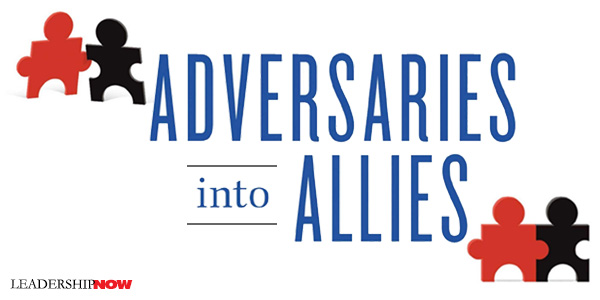 |
 |
11.28.13

Adversaries into Allies
Adversaries into Allies is Leadership 101. Every leader that aspires to be a good leader should read Bob Burg’s book on influence. “Unless you are able to influence the way others think and act, your chances for success in any aspect of your life are limited.” Leadership is intentional influence. Burg calls it Ultimate Influence or “the ability to get the results you want from others while making them feel genuinely good about themselves, about the process, and about you.” He adds, “Consciously shifting your focus away from yourself is about the very best way you can ever influence another.” This is a guidebook to emotional intelligence and should be read from cover to cover. It’s the little things we forget. But here’s a caution: You can’t fake this stuff … for long. These ideas need to be practiced until they become part of who you are. If they are just tools to get what you want, people will know it and it won’t work for you. Influence becomes manipulation when it is about you. “Manipulation aims at control, not cooperation. A manipulator will play on your negative emotions in order to elicit your compliance.” As leaders, we need to keep our motives in check. Burg presents what leadership looks like when it isn’t about you; when the focus is others. While the title states that this book is about turning adversaries into allies, Burg points out that the job of leaders is to “make sure that a potentially difficult person doesn’t become an adversary in the first place.” Our ego often creates these situations. Ultimate Influence is based on five key principles that occur on an ongoing basis: 1. Control your own emotions. When we have our emotions under control we are able to “act out of thought, out of consciousness, and help create a situation in which everyone involved can come away as winners.” Your default setting to pressure situations is directly proportional to your ability to problem solve, to live in the solution, and to lead. 2. Understand the clash of belief systems. Learn to get out of your own head and into the head of the person you’re trying to influence. Not only is it our responsibility to be certain our message is understood by the recipient, it’s just as important to be sure we understand their message, as well. 3. Acknowledge their ego. When dealing with others, remember that “their ego is highly sensitive, and if you want someone to agree with your wishes, you must handle it with extreme caution and care.” Be a judge, not a lawyer. Whereas a lawyer is paid to win the case for his or her client by any legal and ethical means possible, a judge is not. A judge needs to understand both sides of the issue and be as impartial as possible. Human that we are, being impartial is difficult when the ego wants to win at all costs—even if you’re wrong. But the best way to overcome this unproductive desire is to practice being a judge. 4. Set the proper frame. The frame—the context—determines the direction of every interpersonal transaction. If you set the frame you are in control. Expecting someone to be helpful doesn’t change them, it changes you. And that is what changes them. 5. Communicate with tact and empathy. “Tact is the ability to say something in a way that makes the other person feel less threatened or defensive and more open to you and your ideas.” It’s key to becoming an Ultimate Influencer. Empathy—the ability to identify with another’s feelings—and tact go hand-in-hand. “You will naturally display tact when you are truly empathetic to another’s situation. And speaking tactfully will communicate your empathy to that person.” [Give people an out.] You have honored this person by removing pressure and giving him or her the option to escape through the back door. You are not giving them the out so they will take it. Your goal is to make them feel comfortable enough not to feel the need to take it.Burg ends with character. “Even more important that what you say and what you do is who you are.” Your character is what ultimately determines your long-term influence. Be who you say you are. Say little and do much. Develop a reputation as a person who, rather than talking a good game, actually plays a good game. One who, instead of talking about being honest, is honest. Instead of talking about thinking of others, thinks of others. These ideas aren’t rocket science, but they do take work and thought. The problem is we get lazy and resort to command-and-control in a desire to push our own agenda and ideas. Real leadership—ultimate influence—is not easy but it is rewarding. 
Posted by Michael McKinney at 12:25 PM
|
BUILD YOUR KNOWLEDGE
 

How to Do Your Start-Up Right STRAIGHT TALK FOR START-UPS 
Grow Your Leadership Skills NEW AND UPCOMING LEADERSHIP BOOKS 
Leadership Minute BITE-SIZE CONCEPTS YOU CAN CHEW ON 
Classic Leadership Books BOOKS TO READ BEFORE YOU LEAD |